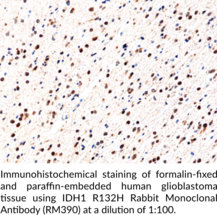Territorial Availability: Available through Bertin Technologies only in France
- Correlated keywords
- RM 390 ?ketoglutarate ?KG D2HG D2
- Product Overview:
Isocitrate dehydrogenase 1 (IDH1) is a NADP+-dependent enzyme and a member of the IDH family.{54763} It is composed of a large domain, a small domain, and a clasp domain and exists as an asymmetric homodimer with active-site clefts formed by the large and small domains of one monomer and the small domain of the other. IDH1 is localized to the cytoplasm and catalyzes the oxidative decarboxylation of isocitrate to ?-ketoglutarate (?-KG) using NADP+ as a cofactor.{54768} A mutant form of IDH1, where arginine is replaced by histidine at position 132 (IDH1R132H), changes the conformation of the IDH1R132H homodimer and IDH1R132/IDH1R132H heterodimer.{54764,54765} The IDH1R132/IDH1R132H heterodimer is unable to achieve the closed conformation needed to produce ?-KG and is enzymatically inactive. The IDH1R132H homodimer is not only enzymatically inactive for its native function but gains the ability to reduce ?-KG to D-hydroxyglutarate (D-2-HG) using NADPH as a cofactor. Exogenous IDH1R132H is oncogenic in vitro and the expression of IDH1R132H in the mouse brain induces tumor nodules in a process resembling gliomagenesis.{54766,54767} The IDH1R132H mutation has frequently been found in tumor tissue derived from patients with secondary glioblastomas but is associated with increased survival.{54766} Cayman’s IDH1 R132H Rabbit Monoclonal Antibody can be used for immunohistochemistry (IHC) applications.
Cayman Chemical’s mission is to help make research possible by supplying scientists worldwide with the basic research tools necessary for advancing human and animal health. Our utmost commitment to healthcare researchers is to offer the highest quality products with an affordable pricing policy.
Our scientists are experts in the synthesis, purification, and characterization of biochemicals ranging from small drug-like heterocycles to complex biolipids, fatty acids, and many others. We are also highly skilled in all aspects of assay and antibody development, protein expression, crystallization, and structure determination.
Over the past thirty years, Cayman developed a deep knowledge base in lipid biochemistry, including research involving the arachidonic acid cascade, inositol phosphates, and cannabinoids. This knowledge enabled the production of reagents of exceptional quality for cancer, oxidative injury, epigenetics, neuroscience, inflammation, metabolism, and many additional lines of research.
Our organic and analytical chemists specialize in the rapid development of manufacturing processes and analytical methods to carry out clinical and commercial GMP-API production. Pre-clinical drug discovery efforts are currently underway in the areas of bone restoration and repair, muscular dystrophy, oncology, and inflammation. A separate group of Ph.D.-level scientists are dedicated to offering Hit-to-Lead Discovery and Profiling Services for epigenetic targets. Our knowledgeable chemists can be contracted to perform complete sample analysis for analytes measured by the majority of our assays. We also offer a wide range of analytical services using LC-MS/MS, HPLC, GC, and many other techniques.
Accreditations
ISO/IEC 17025:2005
ISO Guide 34:2009
Cayman is a leader in the field of emerging drugs of abuse, providing high-purity Schedule I-V Controlled Substances to federally-licensed laboratories and qualified academic research institutions for forensic analyses. We are certified by ACLASS Accreditation Services with dual accreditation to ISO/IEC 17025:2005 and ISO Guide 34:2009.





